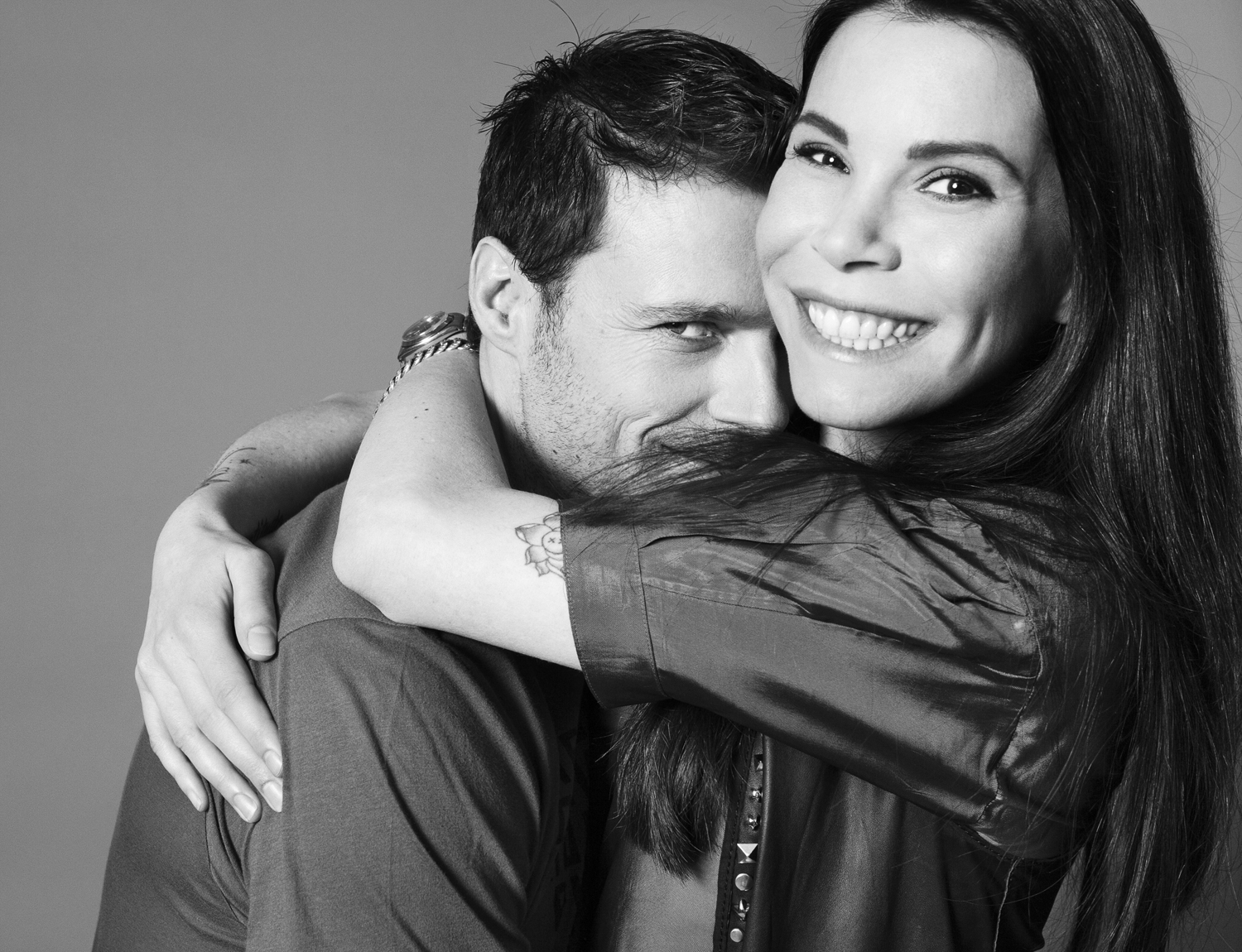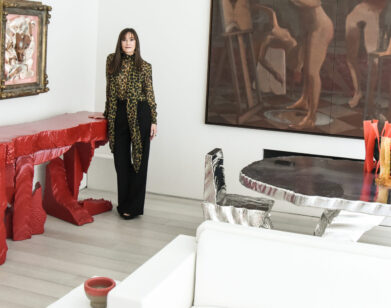How Duncan and Lisca Stutterheim Start the Party

ABOVE: DUNCAN AND LISCA STUTTERHEIM. IMAGE COURTESY OF JOUKE BOS
It’s a warm Saturday afternoon in Amsterdam, and despite the flurry of activity happening on the ground floor of their bohemian canal-side home, Duncan and Lisca Stutterheim appear completely at ease. In less than 10 hours, the couple be whisked away to Sensation, a jubilee of lights, elaborate staging, and electronic dance music set to take place at Amsterdam ArenA, where it was founded (by Duncan, who serves as the event’s CEO) in 2000. Tonight marks the debut of a new show, “Source of Light,” which promises to be as grand as anything the house music-loving pair has come up with yet.
Of course, if the Stutterheims seem relaxed, it’s because they’ve been here before. Sensation (or Sensation White, as it was called after revelers turned up clad in head-to-toe white following the tragic death of its CEO’s brother) is now in its 13th year and has expanded to a whopping 24 countries spanning five continents. Over time, the shows have become more extravagant, incorporating water shows, fire displays, and gigantic moving sets. Still, the couple at the heart of Sensation maintains a simple ethos: “If you like to party, please come,” Duncan tells us from the rug in his living room. “If you don’t, don’t.”
This Friday and Saturday, the Stutterheims will attempt to do something they have never done before, bringing their dance-fest Stateside to Brooklyn’s brand-new Barclays Center. Interview caught up with them in Amsterdam first to find out exactly where Sensation came from, and where it might be headed in the future.
JEFF OLOIZIA: So tell me about Sensation, because it’s something that I think Americans are just now becoming familiar with.
DUNCAN STUTTERHEIM: Sensation is our flagship event. I think the real fanatic travelers to Europe, the people who go to Ibiza, people who love electronic music, they already knew about it. But it’s just the beginning now in America. If you see the numbers on the Internet, they’re growing exponentially; I think [Brooklyn] already has the biggest Facebook page of all our locations. So there’s definitely something happening in the whole electronic revolution, as I call it. It was hard because we really needed a good location, and we needed a good partner and the timing is very important for us. It took us a long time to find all those three, and now we finally found it in Brooklyn.
OLOIZIA: How did the idea for Sensation come together in the first place?
DUNCAN STUTTERHEIM: Well, I’m a soccer fan, and when [AFC] Ajax moved to the stadium, I was sitting there going “Wow, I would love to do a party here.” So we started talking to them, and after two years of talking they said, “Okay, let’s do it.” We really had to come up with something special, something different. So from the first day on, we spent a lot of money on decorating, because to transform a full stadium into something like a party, it’s a hard transformation. A lot of people didn’t trust us. And the first time we tried, we only sold about 1500 tickets, but it was enough to have a good party, and people were amazed about that.
LISCA STUTTERHEIM: If we think back to the first time, we had stages with dancers, and one of them didn’t show up, so we had three dancers and four stages. And it has evolved to something so spectacular because every time we say to each other, “Every year has to be better than the last.” I was there yesterday for the 12th time, I think?
DUNCAN STUTTERHEIM: 13th.
LISCA STUTTERHEIM: 13th already, wow. So we’ve known each other 13 years. And I was like surprised and nervous and excited, just like every time. It’s never boring, you know?
DUNCAN STUTTERHEIM: And that’s our biggest fight, of course, too, after 13 years, to keep it special. Some people, when they’ve seen Sensation four times, say, “I’ve seen it.” But each year is a different show. Every time we try to find the boundaries of technique. I think 50 percent is the technique and the show and 50 percent is still the people who come and really create the party.
LISCA STUTTERHEIM: Yesterday we had the rehearsals, where there were only like 200 people or something, and I said, “It was great, but there’s something missing.” It’s the crowd.
DUNCAN STUTTERHEIM: We think a good party is bringing good people together. And that’s why we also wanted to move to New York ourselves, because to bring in the right people—it’s not just selling the tickets, but you want to have the right people at the tables. We work with Provocateur in New York; they know the audience for the tables, we know the audience for the electronic music people, and we have the international guests. And all those people together make Sensation. We really work at it for months.
OLOIZIA: I’m glad to hear that. I think too often the focus is on just selling tickets, instead of bringing people together who really just want to be there to have a good time.
DUNCAN STUTTERHEIM: We don’t know all the profiles of the New York people, but we do ask them, “Do you like to party?” A good example now—the Miami [electronic dance] conference, what’s happing, a lot of hip-hop guys are there as well. And one thing we really don’t like is that, like, Puff Daddy is there, and he barges in with 10 of his security guys, and instead of the DJ, everyone is suddenly watching him. It’s like, “What the fuck is happening the room?”
LISCA STUTTERHEIM: That’s something we definitely will not tolerate.
OLOIZIA: I’d imagine the crowds are quite a bit different from city to city.
DUNCAN STUTTERHEIM: Yeah. The Russian people are really more—when they come in, they look a bit angry, you know, and then at the end of the evening they’re crazy. The Spanish people were already sitting at four o’clock in the afternoon at the square having drinks. The Chilean people are the most ecstatic of all, which you wouldn’t expect. I’m very surprised at how Asia is going to be. I hope in New York people are going to enjoy themselves.
OLOIZIA: I would assume the two of you have gone through some growing pains in having the event for so many years now. Was there anything you learned the hard way when you started out?
LISCA STUTTERHEIM: We lived in Australia for two years, and it was one of the highlights of my life because we had the biggest venue then—we had 45,000 people—and within a year, we sold out the party. But we couldn’t find a sponsor, because house music in Australia just wasn’t what it is here, and we didn’t have a partner either. So even though it was the best party, we lost a lot of money.
DUNCAN STUTTERHEIM: Also, in Russia, there are still some different rules for paying. The guys wouldn’t drive, wouldn’t pick up our decorations; then you’re glad that your local partner is still somebody there. In Chile we had a big rainfall and there were holes in the roof. I mean, you don’t expect that. There was a hole directly above our lighting table, so our whole thing on Friday night just went “boom!” We also had DJs who couldn’t come to Iceland because of a volcano.
LISCA STUTTERHEIM: DJs who show up too late, DJs who are drunk. We had an [electronic] thunderstorm that was one of the big moments of the night, and it didn’t work when was supposed to work. Lots of things happen, but that makes it exciting as well.
DUNCAN STUTTERHEIM: We’ve had a lot of tiny fuck-ups along the way.
LISCA STUTTERHEIM: I think what got us further, if we’re talking about the music for example, was that at some point we decided to really get involved and talk to our DJs. If the DJs play really different music or can’t agree on things, it can really fuck up the night.
DUNCAN STUTTERHEIM: Look—in the end, if the lights fall out or a dancer is sick or if your laser breaks, it’s fine. But if your music is not good, it’s big. And what’s happened the last however many years more and more is that DJs are getting to be more like pop stars, where they’re focused only on themselves rather than just putting records on to create a good evening for everyone. So if you have five of those guys on stage and if you have five of these performances just focused on the DJs, it’s not about the evening anymore. So we really talk to them: “Okay, you’re the number two.” If you’re the number two DJ you can’t just bang it out; if you’re the last DJ, of course you can have some more energy. It’s very important, and we have a lot of discussions about this.
OLOIZIA: That pacing must be huge.
LISCA STUTTERHEIM: Definitely. For example, if the DJs all want to play the hits and you hear the same hit four times in a night, it’s like, “This is terrible.”
DUNCAN STUTTERHEIM: At Sensation, you’re in one room; it’s one stage, one energy. You can’t walk out. So if you hear a song for the fourth time, you go, “I’ve heard this song.” And some DJs come in 10 minutes before, so they don’t even know what the previous DJ played.
LISCA STUTTERHEIM: Or the guy last year who took the microphone and was like, “I’ve got a number one hit in the States, woo!”
DUNCAN STUTTERHEIM: That’s not what Sensation is about. It’s the whole unity, the whole togetherness. The whole journey of the evening.
OLOIZIA: You’re obviously passionate about this, and it seems like you work well together. What kind of impact does this all have on your personal relationship?
LISCA STUTTERHEIM: We’ve been working for 12 years together, and I started…
DUNCAN STUTTERHEIM: As an intern!
LISCA STUTTERHEIM: We have big arguments. But most of all it’s really, really good; it goes on 24 hours, but it’s nice because if I have to make a decision I can talk to him, and vice versa.
DUNCAN STUTTERHEIM: The only thing you sometimes have to be careful about is if you go out to dinner or with friends, then we really have to promise to each other, “Okay, no work tonight.” But we’re also privileged in that we have a whole organization behind us. We don’t work in the office daily, and we are free together to think about things and to meet new people.
OLOIZIA: It must work if it’s going this well.
DUNCAN STUTTERHEIM: It’s hard for us to explain how the experience is, but I hope we can bring to the States what we created in Holland. It’s like tonight, what’s going on downstairs—there are 250 people having a dinner. They’re paying $2500 for two tickets, so we raised $350,000 for charity. People 18 years old coming from Sweden with their friends, our business partners, sky lounges, VIP tables, and they’re all there together tonight in that one venue. I hope one day in the States we can create the same total experience.
SENSATION “INNERSPACE” COMES TO BARCLAYS CENTER FRIDAY AND SATURDAY. FOR MORE ON SENSATION, VISIT THE EVENT’S WEBSITE.






